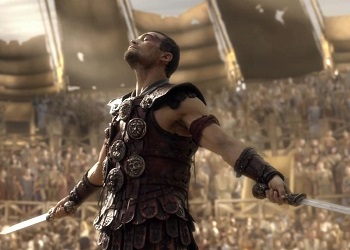Spartacus
 The television series Spartacus is an underrated gem. It didn’t get the acclaim or fandom it deserved. Perhaps it was overshadowed by similar shows, such as the seemingly sexier and grander Game of Thrones. But if you give Spartacus a chance, you’ll find it superior storytelling.
The television series Spartacus is an underrated gem. It didn’t get the acclaim or fandom it deserved. Perhaps it was overshadowed by similar shows, such as the seemingly sexier and grander Game of Thrones. But if you give Spartacus a chance, you’ll find it superior storytelling.
I understand the financial realities of making television. Usually, a series will run as long as possible – or at least until ratings decline. But surely many people switch off – if not physically, then at least mentally – well before that happens. Characters grow stagnant. The same things keep happening.
Look at The Walking Dead. Although the show was engaging early as the characters tried to deal with the zombie apocalypse, it then fell into a cycle: Rick and his crew would go somewhere, meet some other survivors, it turns ugly, zombies attack, and Rick and his crew have to get out. By this stage, Rick has survived zombies so often we know he’s not going to die. There may be new characters, but why care about them given they’ll likely be fodder?
Spartacus is a close-ended series – it went just four seasons, with one of those seasons being a prequel series which they made while season one star, Andy Whitfield (pictured), was battling cancer.
Each episode is self-contained, but furthers the overarching story, like chapters in a book. We’re not introduced to cliffhangers at the end of one episode, only to then follow incidental characters for the next two episodes before finally picking the story thread back up. The story builds logically, but is layered and juggles numerous plots that all serve the same destination.
Other shows have done this successfully. Take Breaking Bad, which ran just the five seasons, but had a clear purpose and journey for the story. Or Babylon 5, which also ran five seasons. Fixed lengths mean you’re not going to overstay your welcome, nor are you going to have to write filler episodes.
The characters are also amazing, as they all have clear arcs throughout the run of the series. They don’t stay the same, as many characters do in television. Spartacus (Andy Whitfield in season 1, Liam McIntyre in seasons 3 and 4) begins as a lowly slave who’s trained to be a gladiator. He becomes the best gladiator there is, but grows disenfranchised with his lot. He leads a rebellion and gathers an army to challenge Rome.
The other characters around him also have journeys: Crixus (Manu Bennett) is the arrogant and hot-headed gladiator, who sees the purpose in Spartacus’s cause and becomes a faithful lieutenant. Gannicus (Dustin Clare) is an irreverent gladiator who doesn’t take life too seriously, until the Romans back him into corner and he learns to empathise with the lot of the common slave. Everybody continues to change throughout the series.
As the characters grow, so does the story, each season handled deftly, introducing an antagonist. The antagonists are not bad for the sake of being bad. They each have their own motives, which they try to cultivate – usually a combination of protecting Rome while furthering their own careers. From the point they’re introduced, they’re set on a collision course with Spartacus. This might sound as if it’s simplifying it but in any story, we need a character to cheer, and we need a character to boo.
A special mention also to Andy Whitfield. This is a role that easily could’ve been misplayed as brutish, but Whitfield infused a quiet nobility in Spartacus, so it becomes easy to believe why others would follow him. Tragically, Whitfield passed away following season 1 from cancer, but his contribution to establishing the series cannot be undervalued.
If you’re looking for good storytelling, give Spartacus a run. You’ll find you invest in these characters and want to follow them on their journey.
